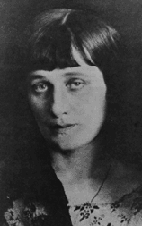Bio & Itinerary (2)
Czech (3)
Deutschland (5)
Hungary (2)
Polska (12)
Post-Trip (1)
Pre-Trip (2)
Russia (10)
The Poets (4)
Travel Tips (1)
* Wien Wieder Sehen (Definitely!)
* Wunderschones Wien!
* Voyage on the Blue Danube (In Pictures)
* Better in Budapest
* Bronchitis in Budapest
* 287 Steps!!
* In Search of Seifert
* Countryside Train, Czech-In!
* Szymborska, Sight-free Day
* Krakow Check-In
* Warsawa, Marie Curie, English Teachers
* Da svidanya!
* 'Snow', Uma, Pushkin & General St. Pete's Nostalgia
* Thelma's Tour Guide
* Peter's Palaces, Fountains, Boats
* Dostoyevsky, Rooftops, Trams, Springer News
* Hermitage
* Rain, Sunsets, Ballet, Neva, Music, Music, Music!
* Anna, Vodka, Lilacs & Elf Shoes
May 02, 2004

MCMXXI
- to Natalya Rkykova
Everything has been plundered, betrayed, sold out,
The wing of black death has flashed,
Everything has been devoured by starving anguish,
Why, then, is it so bright?
The fantastic woods near the town
Wafts the scent of cherry blossoms by day,
At night new constellations shine
In the transparent depths of the skies of July -
And how near the miraculous draws
To the dirty, tumbledown huts...
No one, no one knows what it is,
But for centuries we have longed for it.
June 1921
Instead of a Preface (from Requiem)
In the terrible years of the Yezhov terror, I spent
seventeen months in the prison lines of Leningrad.
Once, someone "recognized" me. Then a woman with
bluish lips standing behind me, who of course, had
never heard me called by name before, woke up from
the stupor to which everyone had succumbed and
whispered in my ear (everyone spoke in whispers there):
"Can you describe this?"
And I answered: "Yes, I can."
Then something that looked like a smile passed over
what had once been her face.
April 1, 1957
Leningrad
Source: The Complete Poems of Anna Akhmatova, Judith Hemschemeyer, translator, Roberta Reeder, editor. Zephyr Press, 1997.
Brief Biography
Akhmatova, Anna, pseudonym of Anna Andreevna Gorenko, was born in Odessa into the family of a naval officer. She started to write very early to ultimate horror of her parents; her father told her not to shame the family name by becoming a “decadent poetess”. She chose the name of her great-grandmother as a literary pseudonym not to embarrass the family. For some time she studied at law school in Kiev. In 1910, she married Nicolai Gumilev, himself a poet and critic, who at first considerably influenced her style. In 1912 her first book of poetry, Evening, was published.
The same year her son Lev Gumilev was born. He would become an outstanding historian, geographer, and philosopher. But meanwhile his father put the child under supervision of his own mother, who disliked Anna. Akhmatova tried to protest the situation, but Nicolai supported his family; Anna visited her son during holidays and summer.
The book Evening made Akhmatova a very popular poetess, and her second book Beads (also sometimes translated as Rosary), 1914, established her reputation. Together with Nikolai Gumilev she was looked at as a founder of the neo-classicist Acmeist movement, which preferred clear and precise verses opposite to the vague Symbolism.
Akhmatova’s third book The White Flock was published in 1917. She remained as far as possible neutral to the Bolshevik Revolution (November 1917). But her husband, from whom she had parted in 1918, was arrested and shot as a counter-revolutionary in 1921, which influenced immensely both her and her son’s life.
After the publication of Anno Domini (1922), she was officially silenced until 1940. During this period she wrote critical essays and translations, worked on a long poem Requiem, devoted to the victims of Stalin’s repressions. In 1940, she was allowed to publish a collection of her previously published poems, but soon the book was withdrawn as her verse was ‘too remote from socialist reconstruction’. Her son, Lev, was arrested in 1949 and held in jail until 1956. To try to win his release, Akhmatova wrote poems in praise of Stalin and the government, but it was of no use. Later she requested that these poems not appear in her collected works.
She was ‘rehabilitated’ in the late 1950s, but her works were heavily censored. Akhmatova’s later works include Poem Without a Hero and the banned Requiem (Munich, 1963), which was published in Russia in full only in 1987, a moving cycle of poems on the Stalin purges; memoirs about the artist Amedeo Modigliani, poets Alexander Blok and Osip Mandelstam.
In 1964, Akhmatova was awarded the Etna-Taormina prize (Italy) and an honorary doctorate from Oxford University (UK) in 1965. Her journeys to Sicily, England and Paris were her first travels outside Russia since 1912.
Two years before her death at the age of 76, Akhmatova was chosen the president of the Writers' Union of the USSR. Anna Akhmatova died in Leningrad (St. Petersburg) in 1966.